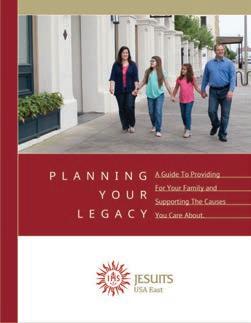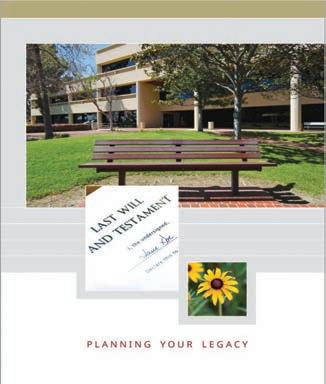
A Mission of
Bringing the light of Christ to those we serve


Bringing the light of Christ to those we serve

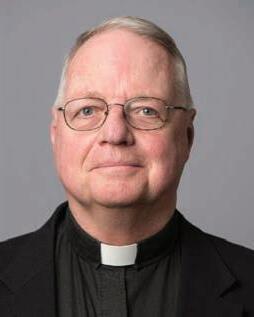
Dear Friends,
“We are called to be tangible signs of hope for those of our brothers and sisters who experience hardship of any kind.”
— Pope Francis
Very Rev. Joseph M. O’Keefe, SJ
It is easy to feel the peace of Christ when things are going our way, but much harder when we, or those we love, are in turmoil or facing serious struggle. Hope is a true gift from God that we receive during these times and, more importantly, one we bring to others in need.
Our hope in Jesus and in His promises is what sustains us through life. 2025 is a Jubilee year marked by Pope Francis with a specific theme—Pilgrims of Hope—which began on December 24, 2024, and concludes on January 6, 2026, the Epiphany of the Lord. What a poignant focus for all of us in our world today, and indeed, what so much of our Jesuit mission compels us to be—pilgrims of hope. Our key feature in this issue looks at the importance of spreading hope, especially to those who often have very little. Hope can be strengthened through direct service to others or often by simply accompanying our brothers and sisters through their trials, an undeniable sign from God that they are not alone.
In our continuing coverage of the Jesuit formation journey, we also highlight our First Studies program that focuses on philosophy and theology studies, integrated with community life and ministry. We recap our priestly ordinations and first vows from 2024, as well as provide an update on how our newly formed Commission on Ministries is helping implement our Province Apostolic Plan. You can also read about how seniors in their golden years are finding hope and inspiration through a new spiritual program, “Ignatian Legacy Fellows,” that meets at some of our Jesuit universities.
On the topic of hope, I want to offer my heartfelt gratitude for the hope you provide the Jesuits of the USA East Province through your continued support. Our men in mission, those in formation, and those who need care later in life rely on the generosity of good people like you.
May the blessing of our Savior Jesus Christ remain with you and your loved ones throughout this “year of hope.”
Sincerely in Christ, FROM OUR PROVINCIAL

Very
Rev. Joseph M. O’Keefe, SJ Provincial, USA East Province
Editors
Michael Gabriele
PJ Williams
Design Capers Design Advancement
Loual Puliafito Provincial Assistant for Advancement
Please address all correspondence to JESUITS magazine: JesuitsMagazine@jesuits.org
USA East Province 39 East 83rd Street New York, NY 10028-0810 212-774-5500
JESUITS is published by the USA East Province of the Society of Jesus. The opinions expressed are those of the individual writers and do not necessarily constitute the official policy of the Society of Jesus.

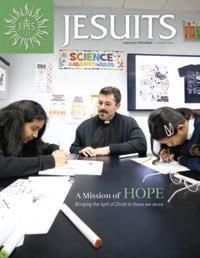
Ignatian Legacy Fellows find new callings in retirement; Fr. Mark Bosco, SJ, with Ignatian “fellow” Mark Sorrell, in the Cave of St. Ignatius, Manresa, Spain.
ABOUT OUR COVER
Fr. Vinny Marchionni, SJ, loves his mission of bringing hope to students at St. Ignatius School in the Bronx and to the local community.

and
two former inmates and residents of Thrive For Life’s Ignacio House. Both graduated from NYU—Mychal earning his bachelor’s degree and Mick earning his associate’s. Mick is continuing his studies for a full bachelor’s degree at St. John’s University.
By Mike Gabriele
FROM A JESUIT PERSPECTIVE, hope is an essential theological virtue, rooted in the Spiritual Exercises of St. Ignatius, one that moves us to journey inward, discerning God’s voice in the quiet moments of reflection and placing trust in His providence. But hope is not a passive state—it is an active, faith-driven response that empowers us to work toward a just and compassionate world, to literally become the hands of God in bringing hope to those around us.

On Christmas Eve, 2024, the Holy Door of St. Peter’s Basilica was opened to officially begin the Jubilee Year— Pilgrims of Hope , declared by Pope Francis’ papal bull, “Hope Does Not Disappoint,” which continues through January 6, 2026, the Epiphany of the Lord. The pilgrimage model of this Jubilee Year is intrinsic to Jesuit life. St. Ignatius himself lived as a pilgrim, journeying across Europe in poverty, humility, and complete reliance on God’s grace. In this sense, Jesuits understand pilgrimage as more than a physical act; it is an exercise in trust and surrender to God. This Jubilee Year also aligns with the Universal Apostolic Preferences (UAPs) of the Society of Jesus, which guide Jesuit ministries worldwide. Jesuits live out hope as both a virtue and a commitment to social justice.
HO“It is indeed hard at times to have hearts of hope when we hear about sad or disturbing events in our world,” says Fr. Joseph O’Keefe, SJ, provincial of Jesuits USA East. “But that is where Christ calls us to go. As harbingers of hope, we are called to bring light and love, even to the darkest corners of our world.”
Jesuits are called to be true “pilgrims of hope,” journeying with others to experience the healing and transformative power of God’s love, especially in times when hope seems fragile. Where do Jesuits and their colleagues in mission find and spread hope?
Pope Francis has opened a Holy Door at a local prison in Rome as a “tangible sign of the message of hope” for people in prisons around the world. Fr. Zach Presutti, SJ, is the founder of Thrive For Life Prison Project, a ministry whose mission is transforming lives behind and beyond prison walls. Through a continuity of care, they accompany justice-impacted people to begin their journey to permanent and successful reentry. Thrive For Life now operates three houses of study for those coming out of prison to continue their studies and live in a supportive community—two in New York City and one

in Milwaukee. “For us, hope is a person: Jesus Christ, the one risen from the dead who came to make all things new,” says Fr. Presutti. “Through the sacramental ministry and Spiritual Exercises that we offer behind the prison walls and the continuity of care offered to those returning from incarceration, Thrive For Life is committed through our accompaniment to journey in hope to a flourishing future.”
While prison ministry brings hope to those who have experienced the confines of prison, another group often struggling to find hope are those within the confines of a hospital—the sick and the dying. Fr. Richard Nichols, SJ, has been recognized for his work as chaplain at MedStar Georgetown University Hospital. He has found that those who experience the love of Christ encounter hope, regardless of the paths that may lie before them. “I have been a witness to profound goodness and generosity among the sick and those who care for them. I have also been a witness to transformations of character and transformations of relationship that were called forth in extreme circumstances. I derive special satisfaction seeing
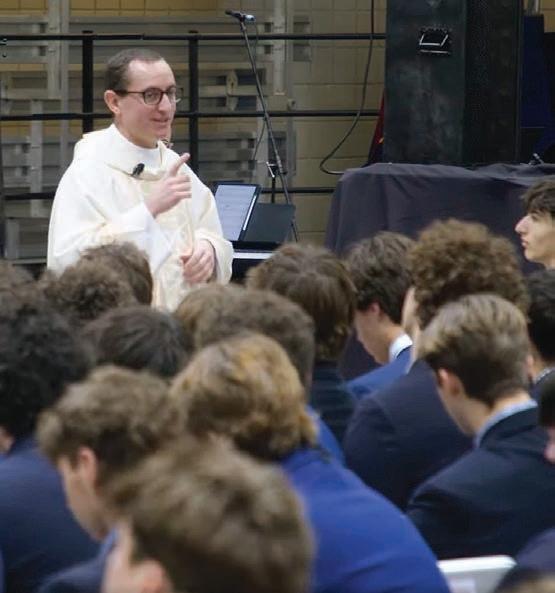

old grudges set aside, grudges not only against fellow human beings, but also grudges against God Almighty. When I see God’s goodness shining out of dark places, it gives me hope for myself and for our fallen world.”
Jesuits also share a firmly established mission to care for and bring hope to refugees and migrants. Many of our Jesuit parishes in the USA East Province have large immigrant populations who find hope in their parish communities. Fr. Hernan Paredes, SJ, is pastor of Our Lady of Mt. Carmel–St. Benedicta–St. Mary of the Assumption Parish in Staten Island, N.Y., home to a large immigrant population, mostly from Mexico. “Our parish is proud to reach out and show solidarity to immigrants who are looking for a place to call home,” says Fr. Paredes. “We give our immigrant community hope by organizing legal clinics, giving away food, bringing access to medical and psychological assistance, as well as free medicines and treatments. Our parishioners can count on the Jesuits
if they must go to court or if they are sick in the hospital. We are proud of walking with them in their struggles. We help them integrate into the larger community, and for some of them, our parish is the last resource of hope in a hostile environment.”
Nick Napolitano, who leads the Justice, Ecology, and Reconciliation initiatives for the USA East Province, also emphasizes the need to bring hope across our perceived boundaries. “In our work for social, environmental, and
“For us, hope is a person: Jesus Christ, the one risen from the dead who came to make all things new.”
— Fr. Zach Presutti, SJ
racial justice, we are united with other pilgrims in solidarity and kinship. We accompany one another in our journey for peace and justice, across boundaries and divisions. Out of these right relationships, seeing and honoring the dignity and divinity of each person, we find a hope that emerges from seeing God in one another at work in our world.”
The Jesuits have always been known for education, and many of the schools in our network were established to make real the hope of a Jesuit education for underserved populations. One such pre-secondary school is the Saint Ignatius School in the Bronx, where Fr. Vinny Marchionni, SJ, has become a true father figure to these young students whose families rely on the school community for resources that go beyond education. These include English language classes and immigration help, as well as providing
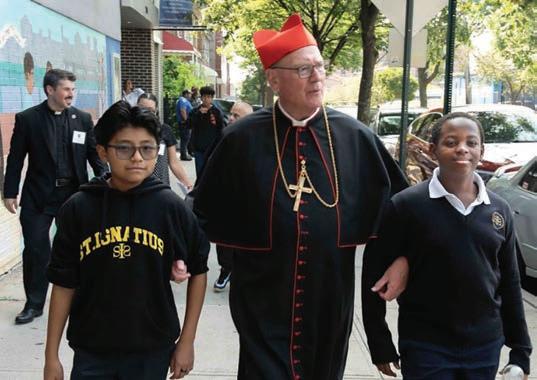
Young adults who go forth from our Jesuit institutions want to do more than hope for the future; they are eager to be catalysts toward it.
common staples such as laundry detergent. Fr. Marchionni loves talking about and sharing the hope he sees in these young students. “When I see how seriously our eighth-graders take the high school placement exam, or how our students love reading to preschoolers in the neighborhood, I know they are being formed into the people God wants them to be. They live out of that hope, and hope is infectious. It reanimates me each day for the mission.”
The third of the four Universal Apostolic Preferences is indeed to “journey with youth toward a hope-filled future.” Young adults who go forth from our Jesuit institutions want to do more than hope for the future; they are eager to be catalysts toward it.
Spe Salvi, that all serious and upright conduct is hope in action. “Hope isn’t naïve optimism,” says de la Fuente. “It’s resolute commitment to the good, and by definition, hope deals with a difficult but possible good. We can and must have hope because God’s love precedes us, sustains us, guarantees the possibility of remaining resolute in pursuing the good.”
Grace Teofilo, a young adult participant in the Contemplative Leaders in Action program, finds that Ignatian Spirituality and prayer help give her hope amidst juggling full-time work and graduate school. “Ignatian Spirituality provides me with a structural framework I can use to guide my prayer practice in the midst of uncertainty,” she says. “Reminding myself of the ways that God is embedded into my daily life allows every action to have a sense of holiness and connects me back to Christ in a way that’s all-encompassing.”

Through the Office of Ignatian Spirituality’s Contemplative Leaders in Action program, young adults become agents of hope for each other and their futures.
“Hope is so important for young people today, as the gravity of this generation’s life experiences seems more profound than the generations of young people before them,” says Mary Beth Cassidy, associate director for Jesuit Connections, an initiative of the Office of Ignatian Spirituality. Her colleague, Dave de la Fuente, associate director for Ignatian Young Adult Ministries, points to what Pope Benedict XVI wrote in his encyclical letter
One special hope for the Jesuits is an increase in vocations to religious life, especially to the Society of Jesus. Hope in action here requires listening, inviting, and supporting. Fr. Patrick Nolan, SJ, director of vocations for the USA East Province, likens this to planting seeds. “In his prayer for this Jubilee Year, Pope Francis wrote, ‘May your grace transform us into tireless cultivators of the seeds of the Gospel.’ I have been deeply moved by the many Jesuits and colleagues who have planted seeds by inviting young men to consider a life of mission as a Jesuit brother or priest.”
Do you know someone who would make a good Jesuit? Perhaps they are hoping for a vocation that brings a sense of purpose to life and to the lives of others. Let them know— plant the seed. Fr. Nolan points out that “Jesus invited people from all walks of life to follow him.”
The 2025 Jubilee Year is a pilgrimage of hope that calls Jesuits and the entire Universal Church to renew our commitment to faith, justice, and compassion. By journeying together as companions in hope, by advocating for peace and reconciliation, we can all experience an ever-deeper understanding of God’s love.
Where can you find and spread hope this year? Everywhere. n



Fr. Mark Horak, SJ, assumed the role as pastor at St. Ignatius Church in Port Tobacco, Md., on Sept. 1, 2024. He succeeds Fr. Thomas Clifford, SJ. Fr. Horak was most recently a teacher and campus minister at Gonzaga College High School in Washington, D.C., and has also served as pastor of St. Thomas More Church in Decatur, Ga.
Fr. James Miracky, SJ, has been appointed to the position of vice president for mission integration and ministry at Saint Peter’s University in Jersey City. This is a new title that underscores the university’s unwavering commitment to embedding Jesuit mission priorities into all of Saint Peter’s educational, spiritual and community efforts.
Dr. Jennifer Thorndike-Gonzales has been appointed to the position of chief diversity officer; executive director of diversity, equity, inclusion, and justice (DEIJ); and project director of the Title V Bienestar grant at Saint Peter’s University in Jersey City. She reports directly to Fr. James Miracky, SJ, and also works closely with the president and the vice president for academic affairs to integrate DEIJ efforts throughout the campus.


By PJ Williams
In 2014, Fr. Adolfo Nicolás, SJ, then Superior General of the Society of Jesus, wrote a letter calling on the Society to assess and improve the intellectual formation of Jesuit scholastics and brothers.
In response to this call, the Jesuit Conference of the United States and Canada undertook a review of its Jesuit formation process and came up with recommendations for how it might be adjusted to follow that directive. The recommendations are embodied in what is known as the Initiative for Future Formation.
One of the stages most impacted by this review was First Studies.
A Jesuit’s First Studies take place after he has spent two years in the Novitiate, the first stage of Jesuit formation. Typically a three-year process, First Studies include two years of master’s-level philosophy studies and one year of theology. There are three houses of First Studies that serve the Jesuits of the United States and Canada located in Chicago,
New York City, and St. Louis. All of them are located close to Jesuit universities where the men can continue their education. Unlike the Novitiate, First Studies houses are not divided by province. This means that men who entered a Novitiate in their home province may not be doing their First Studies in the same province, or even the same country. This can help broaden their worldview and acclimate them to being moved around for future assignments.
Located near Fordham University, Ciszek Hall in the Bronx was selected as the Jesuit Conference-sponsored pilot First Studies program. “The idea was that there would be one pilot that would basically just rethink the whole thing from the ground up, rather than just making some adjustments and turning some dials,” said Fr. Michael Zampelli, SJ, academic director of First Studies at Ciszek. “One of the things they thought could be better
was the connecting of the academic and the intellectual capacity of Jesuits so they would be able to address the real-world issues of the day with the tools they’ve been given.”
In the past, theology studies had come later in Jesuit formation, but they have been pushed up to take place before Regency (the next step of formation) so that Jesuits have more of a theological foundation to prepare them for pastoral work.
One way that Ciszek is working to connect education with action has been through praxis learning. This is where men in First Studies are sent to sites around Ciszek to accompany and serve the community. Ciszek has six different praxis partners, including the Mary Mitchell Family and Youth Center, which helps nurture the potential of youth and families in the Bronx, and Jesuit-affiliated works like St. Ignatius (Nativity) School and Thrive For Life, a ministry that
works behind and beyond the walls of prison.
As part of a two-and-a-half-week orientation program, Jesuits at Ciszek are introduced to the various praxis partners and meet with community leaders. They are then asked to pray about their experiences and share where they are feeling called. This decision is not taken lightly, and men at Ciszek are serious about finding that praxis site where they can best accompany the people of the Bronx. “They’re smart, committed, and prayerful,” said Kevin Yonkers-Talz, director of praxis-based learning at Ciszek. “Having accompanied the Jesuits in formation over the last four years has filled me with a lot of hope for the Society of Jesus.”
Men are sent to praxis sites in teams together and work at a single site during their time at Ciszek. This allows them to cultivate relationships with people at those sites as


One way that Ciszek is working to connect education with action has been through praxis learning. This is where men in First Studies are sent to sites around Ciszek to accompany and serve the community.


they get to know them over time.
An unexpected challenge that men have to navigate when transitioning from the novitiate to First Studies is time management. “They go from doing essentially one thing, living a certain kind of organized life, to getting thrown into studies, which is really quite a full schedule,” said Fr. Zampelli. Men attend daily Mass, go to class, do homework, minister at their praxis site, pray daily, consult regularly with a Jesuit spiritual director, and take on the responsibilities of living in a community.
Fr. Zampelli has found it important to check in with men to make sure they find a balance and do not get burnt out. “You have a life, right? It’s New York City; have you gone to a museum? Have you gone to a play? Are you making friends? One of the things that’s important for them to learn is that they will never, ever just be doing one thing.” At his meetings with the men in formation, Fr. Zampelli reminds them that “As Jesuits, [they will] always have to do more
than one thing.”
“What’s different about the Ciszek pilot program is the intentional focus on integration. We’re really trying to get those three pieces—studies, apostolic work, and the community living experience—talking to one another and being more integrated,” said Fr. William Sheahan, SJ, rector of Ciszek Hall. Each man’s integration is facilitated by private prayer, regular sharing within their class cohort, and the ongoing guidance of the Ciszek staff.
The first cohort of Jesuits in Ciszek’s new First Studies program arrived in 2021 and graduated in May 2024. During this time, the model at Ciszek was assessed and modified where needed. “If you read the Constitutions, what the Novitiate is to be is very prescribed,” said Fr. Sheahan. “First Studies is much more loosely prescribed, and thus it’s a little easier for us to tweak these things.”
The summer before the fall semester of their third year, the men at Ciszek begin a six-month-long scholastic
exchange program at the ITESO Jesuit University in Guadalajara. During this time, they are studying Spanish and continuing their coursework while living in the Jesuit First Studies community in Guadalajara. “It’s meant to facilitate second language acquisition,” said Fr. Sheahan. “The former way of doing it over the course of six weeks wasn’t sufficient for the men.” At the same time, Jesuits in First Studies at the ITESO send a cohort of men in First Studies to Ciszek both to learn English and study for that same fall semester at Fordham University.
In addition to fluency in a second language, other benefits of this arrangement are Jesuits acquiring greater understanding of other cultures, appreciating the differing concerns of the Society of Jesus and the Church outside the U.S. and cultivating international Jesuit friendships. While the Society has grown smaller, the world has also grown smaller thanks to tools like social media and video conferencing. This has allowed Jesuits in First Studies to maintain friendships with their international brothers and start planning for the
future. “They can start dreaming and thinking about some of those apostolic implications of maintaining these friendships,” said Fr. Sheahan. Jesuits currently in First Studies will be the men leading the Society in 20–30 years as provincials, pastors, and heads of schools. The seeds for international collaboration for the Jesuits are already being planted.
While there will be fewer Jesuits in the future, that is not necessarily a bad thing. “The Society is going to be smaller, more nimble,” said Yonkers-Talz. “How agile can you be in relation to what’s happening in the world around you?” While it will take years to see the full outcome of changes being implemented in Ciszek’s pilot program, the men currently in First Studies are being given the tools to best serve as Jesuits. “Giving them access to rigorous philosophical, theological, and social science methods helps them engage that reality. The challenges will, no doubt, be great, but the hope is that they’re going to be agile and wise enough to navigate them.” n

1 THE NOVITIATE
Novices enter a two-year program culminating in the profession of perpetual vows of poverty, chastity, and obedience.
2 FIRST STUDIES
Jesuits study philosophy and theology for three years at Loyola University Chicago, Saint Louis University, or Fordham University.
3 REGENCY
Jesuits work full-time for two or three years at a Jesuit work or apostolate, such as an educational institution, or in pastoral ministry.
4 THEOLOGY
Jesuits continue advanced studies for three years at one of three locations in North America (the School of Theology and Ministry at Boston College; the Jesuit School of Theology of Santa Clara University in Berkeley, Calif.; or Regis University in Toronto) or at the Gregorian University in Rome.
5 TERTIANSHIP
Tertianship is the final step in the formation process and the period of preparation before taking final vows in the Society of Jesus.

On June 8, 2024, four Jesuits of the USA East Province were ordained to the priesthood at the Fordham University Church by Cardinal Stephen Chow, SJ, Bishop of Hong Kong. They were among 20 Jesuits in the United States, Canada, and Haiti to be ordained last summer.
Friends, family, and fellow Jesuits gathered to celebrate these men completing their formation journey to the priesthood. From left to right in the photo are Cardinal Stephen Chow, SJ; Fr. Brendan Coffey, SJ; Fr. Thomas Elitz, SJ; Fr. Brendan Gottschall, SJ; Fr. Chia-Yang (C-Y) Kao, SJ; and Provincial Fr. Joseph O’Keefe, SJ.
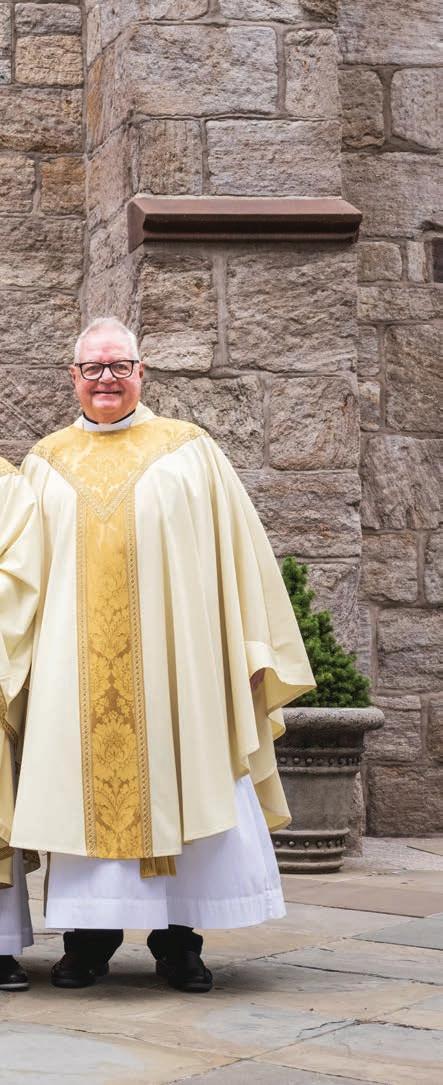
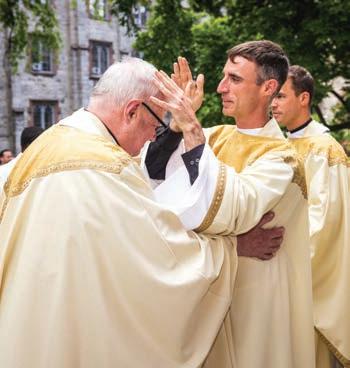

Three Jesuit novices of the USA East Province and one from Canada pronounced first vows on Aug. 10, 2024, at the Cathedral of the Immaculate Conception in Syracuse, N.Y. Pictured from the USA East Province are Mitchell Tu, SJ; Eric Panicco, SJ; and François Venne, SJ;


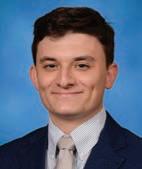
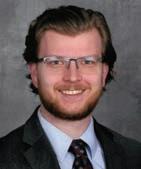

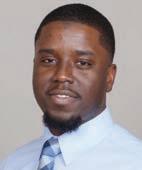


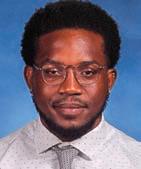





Jesuit novices from the USA East Province enter Saint Andrew Hall in Syracuse, N.Y., for the two-year Novitiate program, culminating in the profession of perpetual vows of poverty, chastity, and obedience.
In First Studies after the Novitiate, most Jesuits study philosophy and theology for three years at Loyola University Chicago, Saint Louis University, or Fordham University.
In Regency, Jesuits work full-time for two or three years at a Jesuit work or apostolate, such as an educational institution, or in pastoral ministry.
In Theology, Jesuits continue advanced studies for three years at one of three




locations in North America (the School of Theology and Ministry at Boston College; the Jesuit School of Theology of Santa Clara University in Berkeley, Calif.; or Regis University in Toronto) or at the Gregorian University in Rome.
Recently Ordained includes men who have completed theology studies and been ordained as priests.
Jesuit Brothers undergo a slightly different but equally rigorous formation process of studies and apostolic work.
Tertianship is the final step in the formation process and the period of preparation before taking final vows in the Society of Jesus.












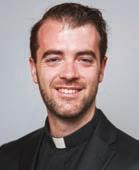






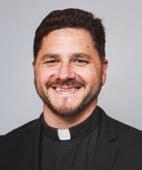
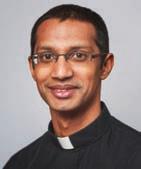




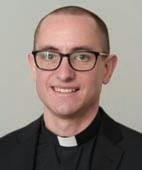

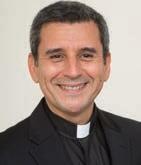
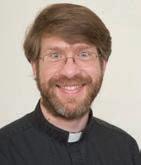


LUSA East Commission on Ministries: Michele
Murray; Daniel Cosacchi; Fr. John Swope, SJ; Fr. Thomas Gaunt, SJ; Fr, Joseph O’Keefe, SJ; Fr. Kevin Hughes, SJ; Roxanne de la Torre; Bryan Galligan, SJ; and Paul Daoust. Missing: Hosffman Ospino.
ast year at this time, Jesuits USA East was dotting the i’s and crossing the t’s on our two-year-in-the-making Apostolic Plan, preparing to send it to Rome for approval by Father General Sosa. The Plan was created to find new and more efficient ways to deploy our resources for the greater praise and service of God and to more fully live out the four Universal Apostolic Preferences of the Global Society of Jesus. In a letter dated May 16, 2024, Fr. Sosa gave his official approval.
Commit to fostering within our Jesuit communities a transformative shift toward a more authentic living of the Jesuit vocation. We envision cultivating a prayerful, supportive, welcoming, and prophetic environment that enriches our shared faith and strengthens our commitment to justice. To achieve this, we envision the restructuring of the Jesuit life-mission to walk with Christ poor and humble.

With the number of apostolically active Jesuits declining and the simple reality of scarcity of time and resources, reducing the number of institutions to which Jesuits are missioned and reimagining our apostolic engagement are imperative. Focusing on the quality of Jesuit presence more than the quantity of those missioned is more reflective of the magis. We thus recognize the need for greater intentionality in the missioning of Jesuits to province-sponsored works.
By fostering Ignatian spiritual formation for mission, the USA East Province will equip and empower more people to develop a unique personal relationship with God that is grounded in the realization that God is actively at work in all creation.
Jesuits USA East will commit intellectual talents, pastoral efforts, and organizational strengths to promote environmental justice and work for racial justice and reconciliation. We also seek to empower second- and third-generation Latino Catholics for Church leadership.
This Apostolic Plan is a robust plan for a robust province, one that will take concerted and thoughtful discipline to move from paper to reality. Careful and determined implementation of the plan is essential. Certain aspects called for quick decisions to be made, and several of our Jesuit communities have already been consolidated to cultivate a better Jesuit community life and save needed funds.
Last summer, we created a Commission on Ministries, made up of Jesuits and lay colleagues, to assist the provincial in dialogue with our partners in ministry regarding implementation of the plan. The Commission includes men and women rooted in the Spiritual Exercises, who are detached from personal intentions and seek only the best paths forward for the province and its apostolates. “I am grateful for the commitment that this tight-knit group of Jesuits and colleagues has offered in assisting me to implement key components of our province Apostolic Plan,” says Provincial Fr. Joseph O’Keefe, SJ. “Their knowledge, acumen, and thoughtful engagement will be invaluable to me as I navigate some of the most important decisions I will make as provincial.”
The Commission convened for the first time in early October 2024 at the Province Curia in New York City to begin discussions and embark on the journey to implement the Apostolic Plan. A key focus of this first meeting of the Commission on Ministries was simply to listen, as directors of various ministries of the province engaged in an overview of where we are, current challenges, and honest thoughts on possible ways forward. “After the presentation about the different ministries of the USA East Province, some members of the Commission were overwhelmed at the scale of our works,” noted Fr. John Swope, SJ, socius for the province. “The Commission will offer advice to the provincial on the best path ahead as we face significant changes in the scale of our apostolic commitments.”
Please keep the Jesuits and our many apostolates in your prayers as we move forward together, as brothers and sisters in Christ, to implement our Apostolic Plan in the service of others and for the greater Glory of God. n


BY WILLIAM BOLE
Just before the pandemic, Margaret Sherlock was getting tired of the daily grind as an attorney for a major insurance company. She began plotting out an early retirement, wanting to be intentional about what came next for her—hoping “to do something for others, and for God,” as she frames it. But she lacked a spiritual and practical roadmap for following these desires.
Many people, like Sherlock, yearn for a meaningful retirement, unbounded by conventional notions of what constitutes a good life in the golden years. Those with a connection to the Jesuit world are able to tap into the resources of Ignatian spirituality, particularly its emphasis on discernment. Jesuits USA East will even match people with a spiritual director through its website, jesuitseast.org
Some are taking a deeper dive—in a sense, going back to Jesuit college. Sherlock, who lives in New Jersey and graduated from Le Moyne College and Fordham Law, found her way through a special initiative, Ignatian Legacy Fellows (ILF), which helps retirees and near-retirees discern fresh callings in their later years. Launched five years ago, the program brings a small cohort of “fellows” together six times over the course of a year for several-day residencies at participating Jesuit institutions and ministries, culminating in a pilgrimage to Spain and Italy.
“They think of this as rewiring themselves, not retiring. It’s a time of vocational importance in their lives,” says ILF director Mariann McCorkle, referring to the fellows, who number around a dozen in each cohort and have ranged in age from 52 to 80. “What have I learned? How can I be of service? What kind of a relationship do I want with my children, and others?” She adds, “It’s a way of completing their Jesuit education and deepening the experience.”
Legacy fellows begin to imagine the possibilities by penning a spiritual autobiography. They look back on early memories, dreams, and desires, and reflect on disappointments and losses as well as joys and

successes—their graces and blessings. Later on, they will craft a statement of desire, expressing their hopes and the wisdom they have gained for what some call life’s “third chapter.”
After a bustling career as a trial lawyer and then as a managing attorney for insurance companies, Sherlock was able to “journey into myself. I looked at all the things that were good in my life, things that were bad, and realized—God is in all of that. God is with me,” says Sherlock, who retired at 61. “It’s lifechanging. It’s a grace, and you have to give it to others.”
During residencies at Boston College, Georgetown University, and Santa Clara University (which partner with ILF), participants hear talks by Jesuit and non-Jesuit experts on topics like the aging process and its spiritual dimensions, family relationships, leadership, and the landscape of Jesuit apostolates. The fellows grapple with themes informed by the four Universal Apostolic Preferences of the Jesuits. These include “showing the way to God” through spiritual exercises and discernment; walking with the poor and excluded; accompanying young people in their search for a hope-filled future; and caring for our common home, God’s creation.
All through the program, they join in spiritual exercises, especially the Examen, a kind of prayer that encourages people to reflect on specific moments in their day or life and where God might be leading them.
Jack O’Connell, a retired middle school teacher who attended a Jesuit prep school in western Massachusetts that closed in 1975, says that such exercises reignited in him “a sense of wonder. Isn’t it amazing? God’s hand in things.”
“The whole spiritual path marked out by St. Ignatius is well suited to anyone reflecting on their next act, and no less to those contemplating retirement,” says Carlos Aedo, executive director of the Office of Ignatian Spirituality for Jesuits USA East. Though far from retirement age, with kids at home, Aedo says he prepares daily for that phase, using tools of Ignatian spirituality.
“I pray every day for the grace of freedom, to be open to what I encounter in life,” he says, noting that Ignatius used the word “indifference” to describe such an attitude. By that, he meant people should not feel attached to their past. “I pray for that every day,” Aedo says. “I try to find meaning in what I do every day.” That spiritual practice will help people
avoid a sense of lost purpose when leaving behind careers.
Life after work can be unsettling, nonetheless.
“I had a very meaningful career. It was just very rewarding, and leaving it was not easy for me,” says Mary Spearing, a former federal prosecutor and white-collar criminal defense lawyer whose Washington, D.C., firm had a strict retirement age. In 2018, Spearing went back to Jesuit school in a literal sense, enrolling in a Georgetown University program that allows people over 65 to audit undergraduate courses. More recently, her literature professor and Georgetown’s vice president for mission and ministry, Fr. Mark Bosco, SJ, told her about ILF (in which he’s involved as a speaker). She’s now part of the newest cohort of fellows, beginning in February.
Her discernment process is underway. “The biggest thing I’d like to do is to remain open to possibilities and other ways of thinking. And also be able to take risks—even if it feels uncomfortable,” says Spearing, a Fordham Law graduate. One thing she isn’t leaving behind is her involvement with Washington Jesuit Academy, which serves inner-city students in Grades 4–8. Among other work, she sponsors students, covering their tuition and staying in touch with them.
Ignatian spirituality is a journey both inward and outward. Several of the legacy fellows have since gone forth as volunteers for Ignatian Volunteer Corps (IVC), which provides older men and women with opportunities to serve the poor. One of them, John Egner, a management consultant and Saint Joseph’s University alumnus, collects boots and socks for the homeless in Philadelphia and serves as a board member of The Pedro Arrupe, SJ, Center for Business Ethics at Saint Joseph’s University.
In 2020, the first cohort of fellows
launched a particularly ambitious and collective effort after visiting Lima, Peru, where the Society of Jesus operates a multitude of social ministries. They saw families living in shacks with corrugated tin roofs, built on steep and dusty hillsides. That wasn’t what struck them the most, however. “These people had nothing, but they were happy. You could see the joy on their faces,” recalls Thalia Doherty, a Turner Broadcasting retiree who went through ILF with her husband, Kelly, both graduates of Santa Clara University.
Led by another Santa Clara graduate, Jason Zenk, an investment manager who was not yet retired, the cohort decided to raise money and open their pocketbooks for a major renovation and expansion of a Jesuit-sponsored community kitchen in Lima. Christened the Padre Michael Garanzini, SJ, Comedor
Communitario, honoring the Jesuit who chairs the ILF board of directors and serves as president of the Association of Catholic Colleges and Universities, the upgraded facility opened in 2022. The kitchen feeds 100 people a day, staffed mostly by single mothers who learn business skills they have used in creating their own small enterprises. It has become part of a regular immersion experience for ILF participants, a way to accompany the poor. Through such an experience, people can find not only purpose but also community. ILF alumni say the fellows become friends for life and support each other spiritually and emotionally. They meet for summer reunions and re-engage with the program.
All that is part of a continuing Jesuit education. The learning isn’t
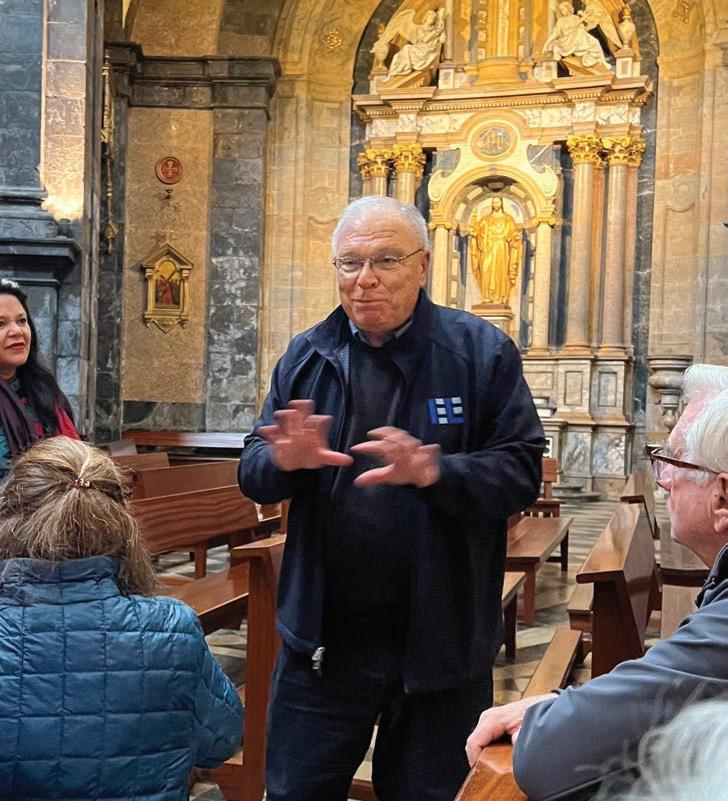
“There’s a lot still to discern and pray over, but one thing for sure about retired life: There’s so much more I can give, so much more I can be.”
— Margaret Sherlock
altogether different from the undergraduate years, when the object is to develop the whole person, intellectually, socially, and spiritually. (The tuition can be similar too: $50,000 for ILF’s year-long adventure, with partial scholarships available.) But whether it’s an initiative like ILF or a nine-month program of directed spiritual exercises offered through a Jesuit parish, something else is called forth, something that might elude a younger soul. “It’s wisdom,” says Fr. Garanzini, who travels with the fellows. “It’s the clarity of who I am and what I have been given.”
Margaret Sherlock says that once she attained such clarity, “God just dumped projects on my doorstep.” She takes an active role in the Sisters of Charity of Elizabeth, N.J., fundraising for an array of ministries that include a downtown storefront offering various kinds of support to immigrant women. She’s also more intentional about her relationships with neighbors on the Jersey Shore, more disciplined about her piano playing as well.
There’s a lot still to discern and pray over, but Sherlock says she knows one thing for sure about her retired life: “There’s so much more I can give, so much more I can be.” n
By Joe Williams


You only need to hear Fr. Tom McMurray, SJ, speak briefly about his current ministry before quickly realizing something special is happening in Worcester with the Spiritual Exercises. But it all started with him saying, “No.”
Eleven years ago, he was new to Worcester and to his role with the Jesuit Community at the College of the Holy Cross when a small group of laypeople approached him with an interest in spiritual direction and a desire to promote the Spiritual Exercises locally. Having made the Exercises several years earlier, this group of six (made up of three couples) continued to feel deeply moved and inspired and wanted to share something of that experience with others. They wanted Fr. Tom to help them do that.
“I was new to Worcester, I had a new job I’d never done before, and I said, no,” says Fr. McMurray.
“Another one of the group of six spoke to the rector of the community at Holy Cross, asking the same thing. He also said ‘no,’ that he was not in a position to do that. Well, the rector and I sort of crossed paths and these requests came up in conversation, and the two of us looked at one another, and said,‘Do you think the Holy Spirit is saying something here?’ ”
The Spirit was indeed speaking and now, in its ninth year, the Worcester Retreat in Daily Life (RIDL) has facilitated the participation of 154 retreatants in the 19th Annotation, averaging about 17–18 retreatants per year. Like many programs that offer the Spiritual Exercises, the Worcester RIDL runs from the fall to spring each year, with RIDL retreatants meeting as a group once a week in addition to personal prayer, reading, and reflection. Dick Kirk, one of the original six laypeople, and an integral part of the RIDL planning team, attributes the success and vibrancy of the Worcester program to a few key factors, one of which is creating a distinctly welcoming atmosphere.
“We actually have a group of volunteers who come and set up the room for us and make it a hospitable, welcoming place.” says Kirk, whose role on the team is known simply as the administrator. Kirk notes other factors that add to the program’s welcoming nature, including the ambience of trust and confidentiality that is introduced right from the beginning of the retreat. “Both our prayer companions and the retreatants are assured that what they say stays here. They share very personal reactions to what’s going on in their lives as directed by the Exercises,” adds Kirk.
The weekly RIDL gathering offers elements that help build a sense of community among the retreatants. There is a 20-minute sharing circle allowing participants to bring up what’s been going on in their lives in that given week, music incorporated into each session, and holistic applications of the senses, such as laying on of the hands.
The RIDL depends on the support of an inspired and devoted core group of lay volunteers, and as Kirk puts it, “the collaboration that we have with the Jesuits is nothing short of amazing and what
church should be. We feel incredibly empowered and encouraged to give input. It is our shared program, and we are continually affirmed that the gifts of the Holy Spirit come through each and every one of us to make this work better.”
Nineteenth Annotation retreats also require trained and dedicated companions who can accompany retreatants on their journeys.
“Anyone who’s gone through our 19th Annotation is invited to consider and discern whether or not they are interested in becoming prayer companions.” says Fr. McMurray. “That’s how we’ve been sort of growing our pool of prayer companions.”
The Formation Program of the Worcester RIDL has now evolved into a four-year spiritual direction program, focusing on a specific topic each year. (1st year: Spiritual Exercises with Elements of Spiritual Direction; 2nd year: the Skills and Art of Spiritual Direction; 3rd and 4th years: Dynamics of the Spiritual Exercises.) During the third and fourth years, the student goes into weekly one-on-one supervision as they accompany one person, and in the fifth year, they join the main team for peer supervision once a month. Going forward, Worcester will now issue a certificate for spiritual direction for those who go through the entire four-year program.
The Spirit has been busy. Many other 19th Annotation programs are following similar paths. Recently, groups from Syracuse, N.Y., and Portland, Maine, and even one from Montana have reached out to Worcester, interested in learning best practices and even to see what kind of collaboration might be possible in the future. These programs are growing as participants discover the special appeal of the Exercises.
Jennifer Hansen, part of the leadership team of the Ignatian Spirituality Partnership of Maine, along with Fr. Paul Sullivan, SJ, summed it up best. “It’s a toolbox where you learn all these different things, types of prayer that you can take with you. It’s not something that just ends. You take these experiences and these skills with you. And it continues to build. It’s kind of the retreat that never ends. In a good way.”
“It’s a toolbox where you learn all these different things, types of prayer that you can take with you. It’s not something that just ends. You take these experiences and these skills with you. And it continues to build. It’s kind of the retreat that never ends. In a good way.”
Jennifer Hansen Ignatian Spirituality Partnership of Maine
More on the web
Are you or someone you know interested in making the Spiritual Exercises? The Office of Ignatian Spirituality has compiled a list of ministries (including Worcester and Portland) within the USA East Province that offer the full Spiritual Exercises, many of which are offered online and can be made from anywhere. For more information, visit MakeTheExercises.org.
Deceased Jesuits of the USA East Province — November 1, 2023, to October 31, 2024
Rev. John E. Surette, SJ
December 12, 1934–December 6, 2023
Rev. Kenneth J. Urumolug, SJ
February 15, 1965–December 18, 2023
Rev. James A. O’Brien, SJ
April 7, 1927–December 23, 2023
Rev. Francis M. O’Connor, SJ
October 19, 1924–December 23, 2023
Rev. Patrick J. Ryan, SJ
January 6, 1929–December 26, 2023
Rev. Charles H. Allen, SJ
February 13, 1942–January 10, 2024
Rev. Damian O. Halligan, SJ
November 14, 1933–January 10, 2024
Rev. Leo J. Daly, SJ
July 28, 1930–January 14, 2024
Rev. John P. Reboli, SJ
September 9, 1938–February 17, 2024
Rev. Frank R. Haig, SJ
September 11, 1928–February 28, 2024

Rev. James J. Bowes, SJ
October 11, 1935–March 9, 2024
Rev. James M. Bowler, SJ
February 28, 1940–March 20, 2024
Rev. Joseph A. Appleyard, SJ May 9, 1931–March 25, 2024
Rev. John P. Spencer, SJ
March 16, 1947–April 2, 2024
Rev. William J. Byron, SJ
May 25, 1927–April 9, 2024
Rev. Francis J. Ryan, SJ
May 19, 1926–April 16, 2024
Br. Darrell J. Burns, SJ
September 5, 1944–May 3, 2024
Rev. Charles D. Sullivan, SJ
August 28, 1939–May 13, 2024
Rev. Thaddeus J. Burch, SJ
June 4, 1930–May 14, 2024
Rev. Patrick J. Sullivan, SJ
March 21, 1941–May 27, 2024
Rev. John R. d’Anjou, SJ
October 13, 1941–May 31, 2024
Rev. Richard J. Stanley, SJ
July 8, 1941–June 8, 2024
Rev. Liborio J. LaMartina, SJ
March 19, 1935–June 15, 2024
Rev. Oscar Magnan, SJ
May 16, 1929–July 25, 2024
Rev. Henry J. Cain, SJ
September 8, 1929–August 3, 2024
Rev. Peter W. Gyves, SJ August 25, 1951–August 7, 2024
Br. James T. Dennehy, SJ
February 11, 1940–August 23, 2024
Rev. George B. Wilson, SJ November 29, 1928–August 26, 2024
Rev. Joseph W. Lux, SJ November 13, 1940–October 21, 2024
Rev. John R. Donahue, SJ July 3, 1933–October 28, 2024
If you would like to read the obituaries of these and other Jesuits of the USA East Province, use the camera app on your smartphone to scan this QR code and you will be directed to the In Memoriam section of our website.
None of us lives as his own master and none of us dies as his own master.
While we live, we are responsible to the Lord, and when we die, we die as his servants.

Romans 14, 1–9, 11–12




For the past 16 years, the Friends of the Jesuits Golf Outing has raised funds to
On Tuesday, Sept. 17, 2024, more than 100 golfers and supporters attended the 2024 Friends of the Jesuits Golf Outing: The Keenan, in memory of Fr. James F. Keenan, SJ, at Quaker Ridge Golf Club in Scarsdale, N.Y.
For the past 16 years, the Friends of the Jesuits Golf Outing has raised funds to support men in formation and the care of our senior Jesuits. This year, the Formation appeal exceeded its goal and raised more than $50,000. These events have collectively raised close to $4 million over the years.
Following a day of golf with perfect weather, guests gathered for the evening reception to connect with one another, as well as with Jesuits and province staff. The event featured a silent and a live auction, both with fabulous prizes, including opportunities to golf at some of the best courses in the country.
During the evening program, Fr. Patrick Nolan, SJ, provincial assistant and director of vocations for the USA East Province,
talked about his own formation journey. Fr. Nolan spoke on the camaraderie of being in the Society of Jesus and how that ties into St. Ignatius’ vision of sending out Jesuits two by two. In addition to helping with financial support for formation, Fr. Nolan asked attendees to encourage men who could make good Jesuits to consider a life in the Society of Jesus.
We are grateful to Bill Miller, Chair, for his leadership and all the sponsors and participants, especially our Jesuits, who helped convey the importance of the funds raised to benefit the ministries of the province.
This year’s golf outing was the first held in honor and remembrance of Fr. James F. Keenan, SJ, who touched the lives of thousands of students, alumni, parents, and friends during his 65 years as a Jesuit. Fr. Keenan was a staple of past province golf outings, which are now named in his honor.







As friends of the USA East Province, you now have a virtual way to light a candle and have your intentions prayed for by the Jesuits. Our new Virtual Prayer Candle invites the Ignatian community to light a candle via our website to help support our province and have your special intentions prayed for by the Jesuits.
Do you or a loved one have a need that could use a community of prayers? Is there a deceased family member or friend you’d like to pray for and remember in a special way? Is there a conflict in our world that hits especially near to your heart that you’d like the Jesuits to pray for with you?
Scan this QR code to link to our Virtual Candle page, or simply visit JesuitsEast.org. Fr. Provincial Joseph O’Keefe, SJ, will guide you through the process as you reflect on your intentions and “light” your candle.
Br. Christopher Derby, SJ | Provincial Assistant for Spirituality Ministries

The Spiritual Exercises of St. Ignatius Loyola are designed to deepen our relationship with God through prayer, specifically meditation and contemplation. While the way the Exercises are offered has always been adapted to meet the needs of the times, the essential elements have remained unchanged for nearly 500 years. What keeps the Spiritual Exercises so relevant today?
Two qualities of the Spiritual Exercises keep them fresh and effective for new generations of Christians:
First, the insights that St. Ignatius drew from his own experiences, his understanding of himself as a sinner loved by God, his alertness to the ways the enemy of our human nature preys upon our weaknesses, and his seeking
of freedom and consolation—i.e., the ways of God—remain central to our human quest to know God’s love and to respond to that love wholeheartedly.
Second, the enormous flexibility in the way the Exercises may be undertaken makes them so helpful in different times and different personal circumstances. An obvious example is the Retreat in Daily Life, wherein one makes the full Exercises through daily prayer over many months. For contemporary seekers, making the retreat while maintaining one’s ordinary commitments is often the only realistic way to do it—and it can be deeply fruitful. There can also be great benefit from engaging in parts of the Exercises over a shorter time period—a weekend, a week, or eight weeks.
The retreat centers of the USA East Province offer the Spiritual Exercises, as well as many other programs for renewing our faith and discerning God’s call. What are the benefits of attending a directed retreat at a retreat house?
Making an individually directed retreat at a Jesuit retreat center provides a powerful opportunity to progress in one’s relationship with God. Not only is the retreatant receiving suggestions for prayer tailored to their individual journey and present circumstances, but every aspect of the retreat: the silence, the hospitality of the staff, the simple, tasty meals, the beauty of nature, the carefully prepared liturgies, and the companionship of other praying folks in the silence— all work together to enhance the retreatant’s experience.
As a spiritual director yourself, what role does the spiritual director play in accompanying someone through the Spiritual Exercises, or perhaps simply facing any challenge in their lives? When I begin a spiritual direction session, I pause at the start and invite the directee or retreatant to “notice God noticing you.” (I took this from a Jesuit director of mine, who got it from the great Jesuit writer Tony de Mello, who got it from St. Teresa of Avila!) What follows is a space of mutual prayer that guides me as a companion in listening carefully for where God may be at work in the experience of the directee. The work of spiritual direction lies in that attentive listening. I may reflect back what I have heard and possibly make a suggestion to the directee, but ultimately, God deals with God’s beloved child directly, and I need to get out of the way!
The Jesuit Good Samaritan Club is a program that enables the USA East Province to care for senior priests and brothers in our healthcare facilities and helps educate the men in formation—the next generation of Jesuits who will be assigned to our ministries. By signing up for a monthly or quarterly gift, you are not only helping those who have given their lives in service to the Church but are also helping to strengthen our apostolates. If you would like to become a member of the Jesuit Good Samaritan Club, or if you would like more information, scan this QR code, or contact Timothy Olmstead, senior philanthropy officer, at (212) 774-5558 or by email at tolmstead@jesuits.org.

Do you have questions about estate planning? The USA East Province is here to help. We are pleased to offer Planning Your Legacy, a guide to estate planning, along with informational videos by Winthrop Rutherfurd, Jr., a longtime friend of the Jesuits. Visit our website at JesuitsEast.org to learn more about changing tax laws, donating from your IRA or 401(k), and more. If you have already included the USA East Province in your estate plans, or if you would like a copy of Planning Your Legacy, please contact Antoinette McCormick at (212) 774-5551 or by email at amccormick@jesuits.org.
